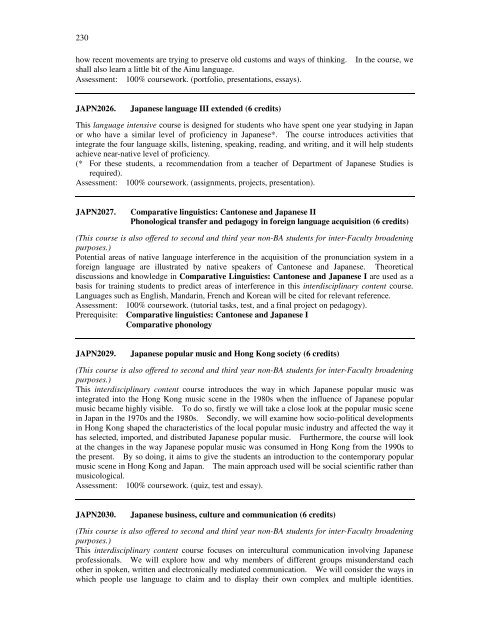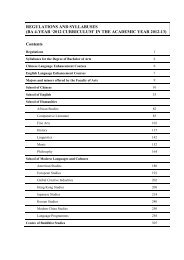Bachelor of Arts (BA) - The University of Hong Kong
Bachelor of Arts (BA) - The University of Hong Kong
Bachelor of Arts (BA) - The University of Hong Kong
You also want an ePaper? Increase the reach of your titles
YUMPU automatically turns print PDFs into web optimized ePapers that Google loves.
230<br />
how recent movements are trying to preserve old customs and ways <strong>of</strong> thinking. In the course, we<br />
shall also learn a little bit <strong>of</strong> the Ainu language.<br />
Assessment: 100% coursework. (portfolio, presentations, essays).<br />
JAPN2026.<br />
Japanese language III extended (6 credits)<br />
This language intensive course is designed for students who have spent one year studying in Japan<br />
or who have a similar level <strong>of</strong> pr<strong>of</strong>iciency in Japanese*. <strong>The</strong> course introduces activities that<br />
integrate the four language skills, listening, speaking, reading, and writing, and it will help students<br />
achieve near-native level <strong>of</strong> pr<strong>of</strong>iciency.<br />
(* For these students, a recommendation from a teacher <strong>of</strong> Department <strong>of</strong> Japanese Studies is<br />
required).<br />
Assessment: 100% coursework. (assignments, projects, presentation).<br />
JAPN2027.<br />
Comparative linguistics: Cantonese and Japanese II<br />
Phonological transfer and pedagogy in foreign language acquisition (6 credits)<br />
(This course is also <strong>of</strong>fered to second and third year non-<strong>BA</strong> students for inter-Faculty broadening<br />
purposes.)<br />
Potential areas <strong>of</strong> native language interference in the acquisition <strong>of</strong> the pronunciation system in a<br />
foreign language are illustrated by native speakers <strong>of</strong> Cantonese and Japanese. <strong>The</strong>oretical<br />
discussions and knowledge in Comparative Linguistics: Cantonese and Japanese I are used as a<br />
basis for training students to predict areas <strong>of</strong> interference in this interdisciplinary content course.<br />
Languages such as English, Mandarin, French and Korean will be cited for relevant reference.<br />
Assessment: 100% coursework. (tutorial tasks, test, and a final project on pedagogy).<br />
Prerequisite: Comparative linguistics: Cantonese and Japanese I<br />
Comparative phonology<br />
JAPN2029.<br />
Japanese popular music and <strong>Hong</strong> <strong>Kong</strong> society (6 credits)<br />
(This course is also <strong>of</strong>fered to second and third year non-<strong>BA</strong> students for inter-Faculty broadening<br />
purposes.)<br />
This interdisciplinary content course introduces the way in which Japanese popular music was<br />
integrated into the <strong>Hong</strong> <strong>Kong</strong> music scene in the 1980s when the influence <strong>of</strong> Japanese popular<br />
music became highly visible. To do so, firstly we will take a close look at the popular music scene<br />
in Japan in the 1970s and the 1980s. Secondly, we will examine how socio-political developments<br />
in <strong>Hong</strong> <strong>Kong</strong> shaped the characteristics <strong>of</strong> the local popular music industry and affected the way it<br />
has selected, imported, and distributed Japanese popular music. Furthermore, the course will look<br />
at the changes in the way Japanese popular music was consumed in <strong>Hong</strong> <strong>Kong</strong> from the 1990s to<br />
the present. By so doing, it aims to give the students an introduction to the contemporary popular<br />
music scene in <strong>Hong</strong> <strong>Kong</strong> and Japan. <strong>The</strong> main approach used will be social scientific rather than<br />
musicological.<br />
Assessment: 100% coursework. (quiz, test and essay).<br />
JAPN2030.<br />
Japanese business, culture and communication (6 credits)<br />
(This course is also <strong>of</strong>fered to second and third year non-<strong>BA</strong> students for inter-Faculty broadening<br />
purposes.)<br />
This interdisciplinary content course focuses on intercultural communication involving Japanese<br />
pr<strong>of</strong>essionals. We will explore how and why members <strong>of</strong> different groups misunderstand each<br />
other in spoken, written and electronically mediated communication. We will consider the ways in<br />
which people use language to claim and to display their own complex and multiple identities.
















